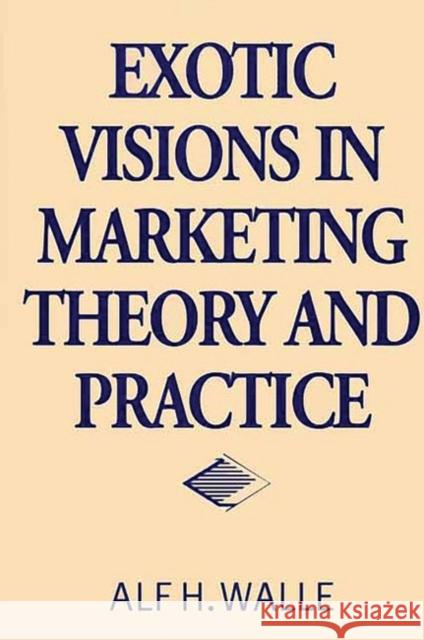Exotic Visions in Marketing Theory and Practice » książka
Exotic Visions in Marketing Theory and Practice
ISBN-13: 9781567203943 / Angielski / Twarda / 2001 / 264 str.
An anthropologist, folklorist, and literary critic besides being a marketing professor, Alf H. Walle takes a refreshingly interdisciplinary look at the impact of modern social thought upon marketing and social research. Tracing key ideas back to their intellectual roots, Walle shows how the evolution of social theory, and the controversies it has engendered, can and should transform the way marketers approach consumers. He provides a theoretic underpinning for qualitative consumer research and presents a lucid theoretical and methodological overview for qualitative methods in marketing, research that parallels what others, such as Shelby Hunt, have provided for scientific methods in marketing. His book is a provocative, thoughtful, and probing study of qualitative social theory and its important contributions to marketing and consumer research. It is of value to both practitioners and academics. Arguing that the social structural methods have been largely ignored, Walle rehabilitates this general method and compares it to poststructural alternatives.
Walle shows that to understand the evolution of modern social theory, one must come to grips with the work of three towering pioneers: Immanuel Kant, Friedrich Hegel, and Karl Marx, and that researchers must understand and appreciate the contributions and influence of pioneers in order to avoid the myopic vision of our own time. Praising Hegel's metaphor of cultures as living organisms and his forging of the concept we now call National Character, Walle points to Hegel as the pioneering social structuralist and as the man who, as a negative example, inspired the poststructuralists to action. Walle ends with a well reasoned analysis of poststructural thought in marketing-consumer research, and suggests that conflict theory--an alternative to poststructural methods that evolved from social structural roots--is often more appropriate than poststructural analysis in marketing and consumer research. Relating both conflict theory and poststructural analysis to the actual needs of marketing consumer researchers, "Exotic Visions in Marketing Theory and Practice" provides unique, practical insights for those who teach market research as well as practitioners who pursue it for a living.











